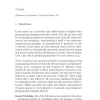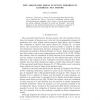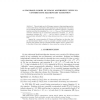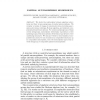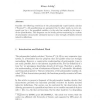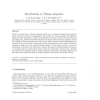APAL
2008
13 years 4 months ago
2008
APAL
2008
13 years 4 months ago
2008
Abstract. We prove a version of the associated sheaf functor theorem in Algebraic Set Theory. The proof is established working within a Heyting pretopos equipped with a system of s...
APAL
2008
13 years 4 months ago
2008
The principal result of this paper answers a long-standing question in the model theory of arithmetic [KS, Question 7] by showing that there exists an uncountable arithmetically cl...
APAL
2008
13 years 4 months ago
2008
APAL
2008
13 years 4 months ago
2008
Abstract. We study the relationship between algebraic structures and their inverse semigroups of partial automorphisms. We consider a variety of classes of natural structures inclu...
APAL
2008
13 years 4 months ago
2008
There is a perfect thin 0 1 class whose upward closure in the Turing degrees has full measure (and indeed contains every 2-random degree.) Thus, in the Muchnik lattice of 0 1 class...
APAL
2008
13 years 4 months ago
2008
Consider the following restriction of the polymorphically typed lambda calculus ("System F"). All quantifications are parameter free. In other words, in every universal ...
APAL
2008
13 years 4 months ago
2008
Building on previous work by Coquand and Spiwack [8] we construct a strict domaintheoretic model for the untyped -calculus with pattern matching and term rewriting which has the p...
APAL
2008
13 years 4 months ago
2008
